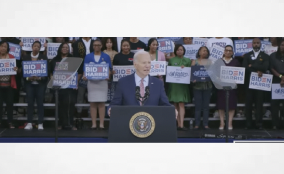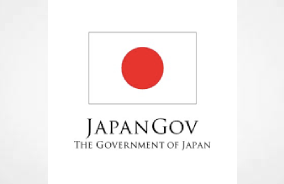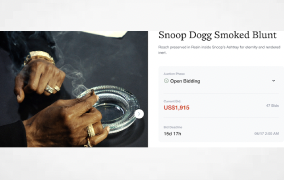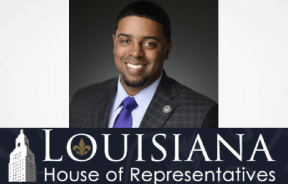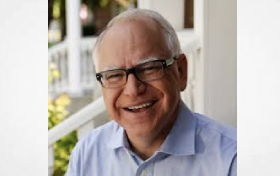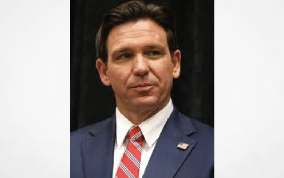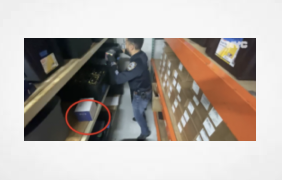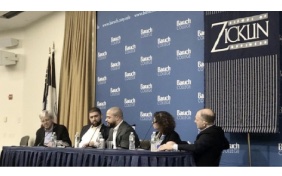The Robert Zicklin Center for Corporate Integrity facilitated a discussion about New York’s retail cannabis industry in a panel on April 27.
Titled “Legal Recreational Marijuana in the Empire State: Ethical and Practical Implications,” the panel was moderated by David Rosenberg, who is the director of the Zicklin Center and law professor at the Larry Zicklin School of Business. He said he was glad that this event discussed recreational marijuana as “a commodity, not contraband.”
Former New York Gov. Andrew Cuomo signed the Marijuana Regulation and Taxation Act into law on March 31, 2021, legalizing the consumption of marijuana for recreational purposes and the sale of the substance at authorized retailers. The first licensed business opened in New York City in December 2022.
“Much of the tax revenue for sales will be used to invest in precisely those people who suffered from decades of law enforcement that disproportionately targeted Black and Latino communities,” Rosenberg explained. “Further, licenses are being granted with a priority for those with past convictions. I just state my opinion that, from a policy perspective, this is progress.”
The event was facilitated with the intention of addressing issues, such as the ethical challenges faced by first-time marijuana retailers, the role these people should have in helping those who were affected by New York’s former anti-cannabis laws and the allocation of revenue generated from marijuana sales.
The Zicklin Center director was joined by Jesse Campoamor, the CEO and founder of the consulting firm Campoamor and Sons; Vladimir Bautista, the co-founder of the cannabis lifestyle brand Happy Munkey; Jonathan Engel, a professor from the Marxe School of Public and International Affairs; and Elizabeth Kase, the co-chair the cannabis law practice group of the firm Ruskin Moscou Faltischek.
Campoamor worked with stakeholders and senior members of the governor’s team to get legislation on medical marijuana use “over the finish line.”
To incentivize people to come into the retail cannabis market, Campoamor said the state created a $200 million fund to provide access to capital.
While the state is prioritizing individuals impacted by the “war on drugs” policy, he acknowledged the nonsocial equity groups and businesses that are waiting to enter the market but shared that he thinks “the most healthy market finds a marriage between corporations and legacy operators — folks who had the longest history with the plan.”
“If you guys consume, if you travel anywhere in the world and meet somebody else that consumes, there’s something that immediately bonds you guys together,” Campoamor said. “You can’t necessarily describe it with words, but there’s this culture you guys are a part of.”
Read more at
Zicklin Center facilitates discussion on ethics of retail cannabis industry
Legal Recreational Marijuana in the Empire State: Ethical and Practical Implications
APRIL 27 AT 12:00 PM – 2:15 PM EDT
About the Program
 The recent legalization of recreational marijuana represents a huge opportunity to create a regulated market for an in-demand commodity that was previously only available in the shadow economy. Of course, the creation of such a market is not simply a matter of allowing entrepreneurs to open for business and to let the invisible hand of capitalism create a supply to satisfy pent up demand. As in some other states, New York’s law was deliberately designed to benefit individuals and communities that had suffered disproportionately under the longtime criminalization of the sale and consumption of cannabis. The issuance of licenses to open dispensaries is therefore not being conducted by examining the usual criteria for receiving such authorization from the government; rather, priority will be given with the goal of redressing past injustices.
The recent legalization of recreational marijuana represents a huge opportunity to create a regulated market for an in-demand commodity that was previously only available in the shadow economy. Of course, the creation of such a market is not simply a matter of allowing entrepreneurs to open for business and to let the invisible hand of capitalism create a supply to satisfy pent up demand. As in some other states, New York’s law was deliberately designed to benefit individuals and communities that had suffered disproportionately under the longtime criminalization of the sale and consumption of cannabis. The issuance of licenses to open dispensaries is therefore not being conducted by examining the usual criteria for receiving such authorization from the government; rather, priority will be given with the goal of redressing past injustices.
Further, as with many other legal products, it is entirely appropriate for the government to regulate the production, distribution and sale of cannabis to ensure public safety particularly because of the product’s addictive qualities, its tendency to impair perception and judgment, and its possible long-term effects on young users. Finally, the fact that recreational marijuana remains illegal under Federal law and the law of a majority of the states, presents many issues not confronted by most goods on the open market.
The event is free and open to the public and will take place on April 27th at Baruch College. Don’t miss this opportunity to learn more about the ethical and practical issues arising from legal recreational marijuana in the Empire State!
Speakers:
Moderated by David Rosenberg, Professor of Law at the Zicklin School of Business and Director of the Robert Zicklin Center for Corporate Integrity, Baruch College
Vladimir Bautista, Co-Founder and CEO, The Happy Munkey
Jesse Campoamor, Founder and CEO,Campoamor and Sons LLC
Jonathan Engel, Professor of Public AffairsMarxe School of Public and International Affairs, Baruch College
Elizabeth Kase, Esq., Attorney and Co-Chair of Cannabis Law Practice Group, Ruskin Moscou Faltischek
Schedule:
12:00 pm – Registration and Lunch
12:30 pm – Presentation
Registration:
Complimentary registration is required to attend this program. Register online, by phone or e-mail:
- Complete the online registration form
- E-mail us at [email protected]
